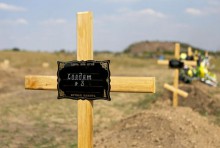Russian President Vladimir Putin has declared data on losses among military servicemen during special operations in peacetime a state secret.
His decree also restricted the information on people being followed by intelligence or law-enforcement agencies in order to have them cooperate on a confidential basis through intelligence, counterintelligence or other operational activities.
Earlier, only the information on the persons already involved in such cooperation was classified.
Amendments were made to the decree of the Russian president Boris Yeltsin No. 1203 from November 30, 1995 “On approval of the list of information that contains a state secret.” Previously, the information about casualties was considered a state secret only during wartime.
What does the Putin’s decision show us?
Semen NOVOPRUDSKY, independent journalist, Moscow:
“In the current situation it might be connected with what Russia is doing in the Ukrainian crisis. Through this decision the government also makes it abundantly clear that they will not allow any further attempts in repeating what Lev Shlosberg, member of Pskov parliament, had managed to achieve. With his informants he actually proved that the paratroopers from Pskov, secretly buried past summer, had died in Ukraine. We can confidently say that the Kremlin would do its best to keep the Russian population (whether they believe the official propaganda or not) ignorant of where the soldiers are being killed.
“It also shows that Putin is afraid of such leaks. Furthermore, no unambiguous and clear signal that Russia decided to stop or change its foreign policy had been made.
“This decision suggests that Russia will continue to make secret of the casualties to the greatest extent possible, along with hiding it from the relatives of the killed.”
Tatiana NARBUT-KONDRATIEVA, Russian blogger (facebook.com):
“For the disclosure of information about the loss of personnel in peacetime you face up to seven years in prison. Well, well, ‘jailbirds’! Shall we keep silence on how many were killed among those ‘who are not there’? And about the boys beaten to death in the barracks, about those who hanged themselves, or who were raped with mops, of those our sons who died in hospitals from numerous internal organ injuries? Shall we shut up? And we will happily send the boys to the army, right? A Committee of Soldiers’ Mothers should have long been behind bars. Together with Shlosberg.”
Dmitry SHUSHARIN, historian, political journalist; Moscow (facebook.com):
“Avoiding unnecessary wordiness and exposure, I can say one thing: there will be special operations. And they will be large-scale.”
Valentyn BADRAK, military expert, director, Center for Army, Conversion, and Disarmament Studies, Kyiv:
“Russia is a police state and it constantly cracks down on its society. But the question is not what is it doing, but why is it doing it now. A few days ago we faced the fact that Russia had almost outlawed NGOs, and in schools they now teach how to prevent revolutions and any manifestations of public dissent. Now the information on the deaths in ‘peacetime’ is being made confidential. Putting these things together, I have the impression that Putin’s regime is greatly shaking. That is a sign that today both the regime and Putin himself are having a tough time, and that’s why they take a number of measures to create even more brutal police state. This is the main meaning behind all these acts.
“Speaking of full panorama of what is happening in Russia, we should notice the bullying coming from the ‘radically non-serious people,’ who play the part of ‘heralds’ – remember the role that court dwarfs, clowns, buffoons, and fools played before the kings, actually saying what the monarch thought and wanted to say himself. For example, from the mouth of Zhirinovsky, Putin says about the annexation of new territories etc. That is also a specific manifestation of a police state, which declares: ‘We will defend on the inside, but we have teeth to make things worse for the outside as well, so you better leave us alone.’”







